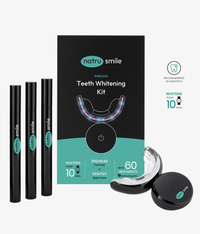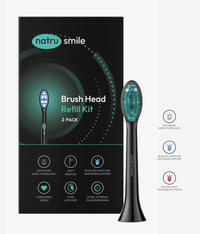
All products are certified by dental expert Dr. Greg Grillo
When you smile, the world smiles to you, or so they say. But what if your smile is holding you back?
Your smile is a universal language that communicates warmth, joy, and confidence. It's a powerful tool that can open doors and create connections.
However, if you're dealing with an overbite, you may feel like your smile is doing more harm than good. It can make you feel self-conscious, insecure, and hesitant to show off your pearly whites. Not to mention the pain and discomfort it can cause.
But, there's good news.
Modern orthodontics has come a long way in recent years, and there are now several solutions available to fix an overbite. Braces are one of the most popular and effective options. They work by gently shifting your teeth into their proper positions, correcting the alignment of your jaw, and creating a perfectly aligned bite.
By using braces for overbites, you can say goodbye to speech impediments, difficulty chewing, and jaw pain. You'll be able to enjoy your favorite foods without worry and speak with confidence and clarity.
But the benefits of braces go beyond functional improvements. They can also transform your appearance, giving you a perfect smile that radiates confidence and joy.
Imagine stepping into a room with your head held high, flashing a smile that lights up your face and captures the attention of everyone around you. That's the power of using braces for overbites; they can change your smile and help you unlock your full potential.
In this guide, we'll explore every aspect of overbites, how they affect you, and what braces can do to help. We'll cover the different types of braces, the timeline of the treatment process, and how to have the best experience with them.
Whether you're looking to fix an overbite with braces yourself or you’re looking for information for someone else, this guide will provide you with all the information you need to make an informed decision.
What Is An Overbite? A Quick Look
An overbite is a dental condition where the upper front teeth overlap significantly with the lower front teeth.
In a normal bite, the upper teeth slightly overlap the lower teeth, but in an overbite, the overlap is excessive, resulting in a misaligned bite. Overbites can be caused by a variety of factors, such as genetics, thumb sucking, or improper jaw alignment. They can affect people of all ages, but they are most commonly found in children and teenagers.
The severity of an overbite can vary from person to person.
In some cases, it may only be a minor issue that doesn't cause any noticeable problems. However, in more severe cases, an overbite can lead to speech difficulties, difficulty chewing, jaw pain, or even facial deformities.
Overbites Vs. Overjets
When it comes to dental conditions, it's easy to get confused between overbites and overjets. While they may sound similar, they are actually two distinct conditions that require different treatment approaches.
An overbite, as we've mentioned earlier, is a condition where the upper front teeth overlap significantly with the lower front teeth. It is sometimes referred to as a deep bite.
On the other hand, an overjet is a condition where the upper front teeth protrude excessively beyond the lower front teeth. It is sometimes referred to as a horizontal overbite or buck teeth.
Overjets can also be caused by genetics or habits like thumb sucking, tongue thrusting, or pacifier use. Like overbites, overjets can be classified into mild, moderate, and severe categories based on the severity of the protrusion.
It's important to note that overbites and overjets can coexist in some cases, making the condition more complex and requiring a tailored treatment approach.
So how do you know if you have an overbite, an overjet, or both?
Your orthodontist will conduct a thorough examination and take x-rays to determine the nature and severity of the condition. Once the diagnosis is made, the appropriate treatment plan can be developed.
Do You Need Braces If You Have An Overbite?
If you have an overbite, you may be wondering if braces are the right treatment option for you. The short answer is yes.
Using braces for overbites can be a really effective way to correct them and achieve a properly aligned bite. However, the specific treatment plan will depend on the severity of your overbite and other individual factors.
Untreated overbites can lead to a host of functional and aesthetic problems. For example, a severe overbite can cause speech difficulties, difficulty chewing, jaw pain, and even facial deformities. In addition, overbites can put excessive pressure on certain teeth, most commonly the canine teeth, leading to premature wear and tear, decay, or even tooth loss.
Braces for overbites work by gradually shifting the teeth into their proper positions, correcting the alignment of the jaw, and creating a properly aligned bite.
In some cases, additional appliances such as headgear or rubber bands may be needed to correct the overbite effectively. These devices work in conjunction with braces or aligners to move the jaw into its proper position and create a harmonious bite.
It's important to note that braces can take time to work, and treatment duration can vary from several months to a few years, depending on the severity of the case. However, the results are well worth the investment, as braces can improve not only the function of your bite but also the appearance of your smile, which will last a lifetime.
Do Braces Fix An Overbite?
Braces are one of the most effective ways to correct an overbite and achieve a properly aligned bite. Braces work by gradually applying pressure to the teeth, moving them into their correct positions, and aligning the jaw.
The process of correcting an overbite with braces typically involves three phases:
-
The initial phase: This involves placing the braces on the teeth and applying gentle pressure to begin the process of moving the teeth into the correct position.
-
The second phase: This involves adjusting the braces to continue applying pressure to the teeth and moving them into their proper positions.
- The final phase: This involves removing the braces and replacing them with a retainer, which helps to maintain the corrected position of the teeth.
After these phases are over, the patient will have a properly aligned bite and a more aesthetically pleasing smile. In addition to correcting the cosmetic aspect of an overbite, braces can also improve the function of the teeth and jaws, making it easier to speak, chew, and maintain good oral hygiene.
What Types Of Braces Work Best For An Overbite?
When it comes to using braces for overbites, there are several different types of braces available, each with its own advantages and disadvantages.
The type of braces that work best for an overbite will depend on several factors, including the severity of the overbite, the age of the patient, and the patient's personal preferences.
-
Traditional metal braces: Traditional metal braces are the most common type of braces used to correct an overbite. They consist of metal brackets that are attached to the teeth and connected by wires that apply pressure to move the teeth into the correct position. They are the most effective type of braces for severe overbites and can be used to correct a wide range of dental problems.
- Ceramic braces: Ceramic braces are similar to metal braces, but they are made of clear or tooth-colored materials that blend in with the teeth and are less noticeable. They are a good option for patients who want a more discreet option than traditional metal braces.
- Lingual braces: Lingual braces are attached to the back of the teeth, making them virtually invisible from the front. They work in the same way as traditional metal braces but are less noticeable. They can be a good option for patients who want a discreet option and are willing to tolerate a longer adjustment period.
- Clear aligners: Clear aligners, such as Invisalign, are a series of removable plastic trays that gradually shift the teeth into their proper positions. They are a good option for mild to moderate overbites and can be a more comfortable and convenient option than traditional braces.
It's important to note that while each different type has its advantages, the best type of braces for correcting an overbite will depend on your individual case and needs.
Can You Modify The Growth Of Lower Jaw In Teens And Kids?
In some cases, an overbite is caused by a discrepancy in the growth of the upper and lower jaws. While braces can correct the positioning of the teeth, they may not be able to address the underlying skeletal issue.
There are orthodontic treatments available, however, that can modify the growth of the lower jaw in teens and kids. These treatments are known as functional appliances, and they work by applying forces to the jawbone to stimulate growth or restrict it, depending on the specific case. There are several main types of functional appliances you may come across.
Herbst Appliance
One type of functional appliance is the Herbst appliance, which consists of metal rods that are attached to the upper and lower teeth and connected by a hinge. The Herbst appliance works by positioning the lower jaw forward, which can help correct an overbite caused by a recessed lower jaw.
Headgear
Another type of functional appliance is the headgear, which is worn outside of the mouth and consists of a strap that goes around the back of the head and another that attaches to the braces. The headgear works by applying pressure to the upper teeth and jaw to restrict growth, which can be beneficial in cases where the upper jaw is overdeveloped.
Functional appliances are typically used in younger patients who are still growing, as they are most effective when the jawbone is still pliable. Treatment with functional appliances can take several months to a few years, depending on the severity of the case.
What About Jaw Surgery?
In some cases, correcting an overbite may require more than just orthodontic treatment. If the overbite is caused by a severe discrepancy in the size or position of the upper and lower jaws, jaw surgery may be necessary.
Jaw surgery, also known as orthognathic surgery, is a procedure that involves repositioning the upper or lower jaw to correct the bite. This surgery is typically done in conjunction with orthodontic treatment, as braces will be necessary to align the teeth after the jaw surgery.
Jaw surgery is reserved for cases where the overbite is very severe and cannot be corrected with braces or functional appliances alone. The decision to undergo jaw surgery will depend on several factors, including the severity of the overbite, the age of the patient, and the patient's overall health.
The surgery is performed under general anesthesia and may involve cutting and repositioning the jawbone. Recovery from jaw surgery can take several weeks, and patients may need to follow a special diet and avoid certain activities during the healing process.
While jaw surgery can be an effective option for correcting a severe overbite, it is a major surgery and should only be considered after a thorough evaluation by an orthodontic specialist.
How Much Do Braces Cost To Fix An Overbite?
The cost of braces for overbites can vary depending on several factors, including the severity of the overbite, the type of braces used, and the location of the orthodontist. On average, the cost of braces can range from $3,000 to $10,000.
Traditional metal braces are typically the most affordable option and may cost between $3,000 to $7,000.
Clear or ceramic braces may cost more, ranging from $4,000 to $8,000.
Lingual braces, which are placed behind the teeth, can be the most expensive option, with costs ranging from $8,000 to $10,000 or more.
In some cases, additional appliances such as rubber bands or headgear may also be necessary, which can increase the overall cost of treatment.
One of the most significant factors that affect braces cost is the severity of the overbite. Generally, the more severe the overbite, the more extensive the treatment will be, which will require an increased cost.
Overbite Before And After Braces
One of the most exciting things about undergoing orthodontic treatment to fix an overbite is seeing the transformation that can take place. Many patients experience significant changes in their appearance and overall oral health after completing their treatment with braces.
Before braces, an overbite can cause the upper teeth to protrude out over the lower teeth, giving an unflattering appearance. The lower jaw may also appear recessed, and the lips may not close fully when the mouth is relaxed.
After completing orthodontic treatment with braces, the teeth and jaw are typically properly aligned, resulting in a more symmetrical and aesthetically pleasing appearance. The upper teeth will sit nicely on top of the lower teeth, creating a more harmonious and balanced look. The lower jaw may also be brought forward, resulting in a more proportionate facial profile.
How Long Does It Take To Fix An Overbite With Braces?
The length of time it takes to fix an overbite with braces can vary depending on the severity of the overbite and the type of braces used. On average, you can expect to have braces from anywhere from 12 months to 36 months. However, more severe cases may take longer to correct.
There are three phases of treatment with braces, and they all have their own timelines.
- The initial phase can take a few weeks to several months, depending on the individual case.
- The second phase can take anywhere from several months to a few years.
- The final phase involves wearing a retainer for a period of time, which can range from a few months to several years.
Now that you’ve learned a lot about overbites and braces, let’s go through the most commonly asked questions on the topic.
Are Braces Necessary For Overbite?
Yes, braces are often necessary for correcting an overbite.
Braces work by gradually applying pressure to the teeth, moving them into their correct positions, and aligning the jaw. They can help to improve the appearance of the teeth and also help to alleviate any functional issues caused by the overbite, such as difficulty speaking or eating.
However, the severity of the overbite will determine if braces are necessary or if other treatment options may be more appropriate.
Are Braces Or Invisalign Better For Overbite?
Both braces and Invisalign can be effective for correcting an overbite, but the best option will depend on the individual's specific needs and preferences.
Traditional braces use metal brackets and wires to apply pressure and gradually move the teeth into the correct position. They are often the more affordable option and may be more effective for severe cases of overbite.
Invisalign, on the other hand, uses a series of clear, removable aligners to shift the teeth gradually. Invisalign aligners are nearly invisible and can be removed for eating and brushing, making them a popular choice for those who prioritize discretion and convenience. However, Invisalign may not be as effective for severe cases of overbite.
How Big Does Your Overbite Have To Be To Get Braces?
The decision to get braces for overbite is not solely based on the size of the overbite. Rather, it depends on the degree of misalignment and the impact it has on a person's dental health and overall well-being.
In general, if an overbite is causing functional problems, such as difficulty biting or chewing, speech impediments, or jaw pain, braces may be recommended regardless of the size of the overbite. Similarly, if an overbite is causing significant cosmetic concerns and affecting a person's self-esteem, braces may also be recommended.
However, if an overbite is relatively mild and not causing any significant problems, braces may not be necessary.
Can Braces Make An Overbite Worse?
It is very rare for braces to make an overbite worse.
In fact, braces are a highly effective method for correcting an overbite. However, it is important to choose an experienced orthodontist who will carefully assess your individual case and determine the best treatment plan for you.
In some cases, it may be necessary to use additional appliances, such as headgear or rubber bands, to correct the overbite. Improper use or adjustment of these appliances could potentially worsen the overbite. This is why it is crucial to follow the instructions of your orthodontist closely and attend regular appointments to monitor the progress of your treatment.
In rare cases, a small overbite may develop into a more severe overbite during the course of orthodontic treatment. However, this is usually due to underlying skeletal or growth issues, rather than the braces themselves.
In such cases, your orthodontist may recommend additional treatment, such as jaw surgery, to achieve the desired results.
Wrapping Up
As you can see, an overbite is not something to take lightly.
It can be a source of embarrassment and insecurity for many people, but modern orthodontic treatments offer a range of effective solutions. Using braces for overbite is one of the most popular and successful options.
While the cost of braces can vary depending on several factors, including the type of braces used and the severity of the overbite, the investment in a confident and beautiful smile is well worth it.
Braces are a safe, effective treatment for an overbite, and now with this guide, you are prepared with everything you need to know about them.












